1028 views on LinkedIn – 25 Likes
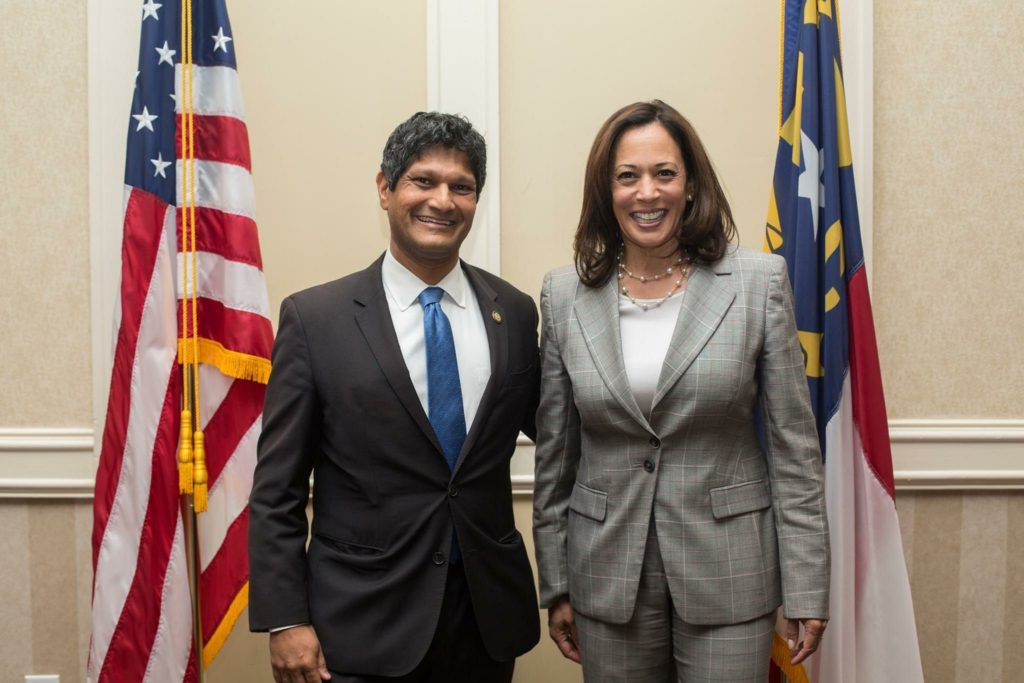
Indian-American Legislators Share Their Winning Stories
For Indian-Americans, 2020 has been quite a year in the political life of the country – they not only brought out the vote for the winning Biden-Harris ticket but have also won some considerable victories up and down the ballot. The big victory was getting the four desi representatives in the US Congress re-elected – Ami Bera, Pramila Jayapal, Ro Khanna and Raja Krishnamoorthi.
Over 70 Indian-American candidates had stood for public office and there were some losses and considerable gains too. Some of the winning candidates include Nima Kulkarni (KY State House, HD-40), Kesha Ram (VT, State Senate) Nikil Saval (PA, State Senate) Jeremy Cooney (NY, State Senate, SD-56), Kevin Thomas NY State Senate, District -6. Vandana Slatter (WA, State House District 48), Padma Kuppa (MI, State House 41), Jay Chaudhuri (NC, State Senate), Ravi Sandill (TX, 127th District Court Judge), Amish Shah (U.S., State House AZ-24), Jenifer Rajkumar (NY, State Assembly District 38),and Ranjeev Puri (MI State House, District 21). Their wins in the state and down ballot races shows that Indian-American politicians are working their way up, building muscle and embedding themselves in the local issues which matter most to ordinary Americans.
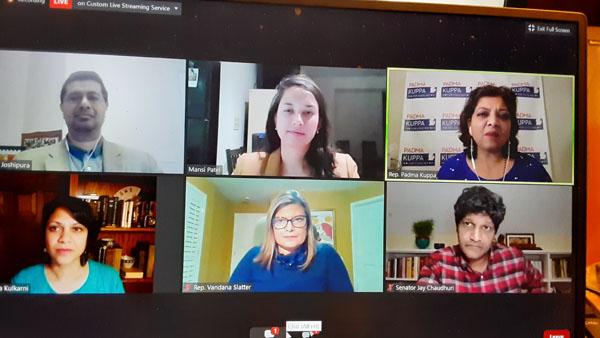
[dropcap]“W[/dropcap]e stand on the shoulders of so many hard-working Indian-Americans that came to the state, came to this country before, including folks like my parents,” Jay Chaudhuri, who was re-elected to the North Carolina State Senate, told a virtual panel organized by Indiaspora, a community organization. He pointed out that the Indian-American community was absolutely pivotal in battleground states like North Carolina and Georgia. “As we see more and more Indian Americans move to the state it’s absolutely critical that we invest in those communities because they tend to be concentrated not only just in the Research Triangle in Charlotte area but the suburban counties that are around those major metropolitan areas.”
Chaudhuri was the first Indian-American elected – and now re-elected – to the NC legislature, and has worked for two decades in all three branches in state government. As Special Counsel to Attorney General Roy Cooper, Jay helped lead an investigation by all 50 Attorneys General that resulted in a landmark agreement with social networking sites, MySpace and Facebook, to protect children from Internet predators. As General Counsel and Senior Policy Advisory to State Treasurer Janet Cowell, he helped recover almost $100 million back to the pension and escheat funds. He also helped to establish the first ever Innovation Fund, a $230 million fund to invest in businesses with significant operations in North Carolina. In the 2019-2020 session, Senate Democrats elected him as Minority Whip, the second-highest ranking position in the State Senate.
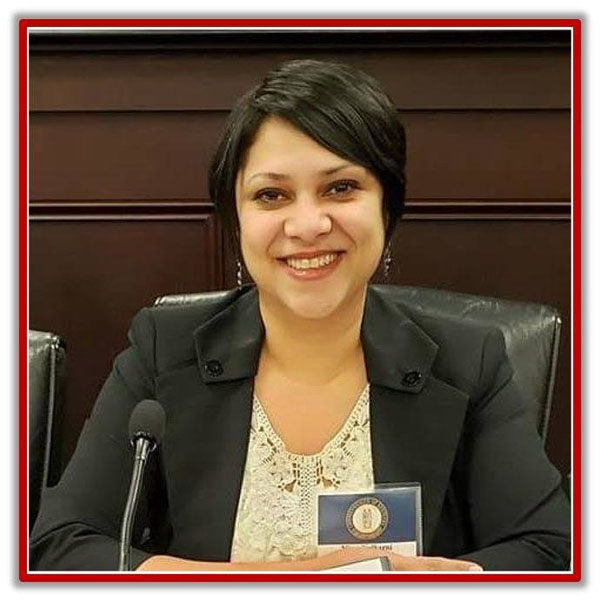
[dropcap] I[/dropcap]ndeed, Middle America is crucial to the battle for turning America blue as the support of battleground states is needed if the Biden-Harris Administration is to succeed in the tremendous health and economic challenges facing the country. Nima Kulkarni (KY State House, HD-40) had a light-hearted response to these dilemmas: “Welcome to Kentucky, the land of Mitch McConnell. I’m going to start off by apologizing to everybody for his re-election, but here we are, and I am still optimistic.” Kulkarni, who was born in India, is the first Indian to not only be elected but re-elected to the General Assembly by a whopping 80 percent in a red state in a sharply divided nation.
As she says, “What we need to remember, especially in my district which doesn’t have any Indian people – it’s a lot of white and black working-class families – what it’s about is how you are going to make their lives better.” Her district is a blob of blue in a sea of red, and she says, “If you’re able to talk to people, address their concerns, there’s a shot at getting people together at the table and having a conversation that doesn’t devolve into rhetoric and attacks.”

[dropcap]P[/dropcap]adma Kuppa (MI, State House 41), who was endorsed by President Obama, fought a very tough race and prevailed in Michigan, a state that is changing demographically. She says, “I should first say that actually my win was declared with about 10 point lead – this is my first reelection. I flipped a district that had historically never been democrat before.” Kuppa’s area is in the suburbs, an area being remade by immigrants of all colors, but especially Indian-Americans. They have her ear when it comes to issues of concern like small business, affordable education and H1B immigration.
As she emphasizes, Michigan is the home of the middle class and working-class and immigrant families so issues of public education must be addressed at the state level. “We need to address public education and make sure that the kind of charter school landscape that we have here isn’t inequitable. Right now the quality of education that you get depending on your zip code is not acceptable to anyone in the immigrant community and I think that was something that resonated when I ran in my district.”
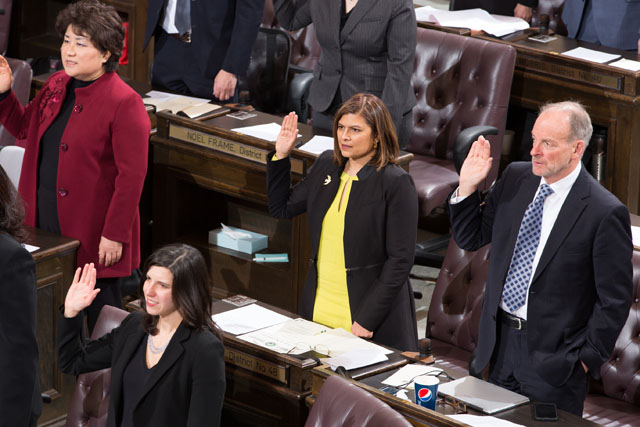
[dropcap]C[/dropcap]an you win by losing? Dr. Vandana Slatter was first elected to the WA State House in 2018, the first Indian-American to win election and she has just been re-elected with a resounding margin. Yet as she says she started her political career by losing. “My entrance into running for office actually started at the local level, when I was running for Bellevue City Council in 2013, and I lost that race. It was what I call my political MBA. I learned a lot about how to run for office and what that meant.”
Slatter, who was born in British Columbia to Indian immigrant parents, immigrated to the US as a student. A Doctor of Pharmacy (UW), she has worked for the past twenty-plus years at leading biotechnology companies, including Amgen and Genentech, and is a licensed pharmacist in the State of Washington. All her many skills now serve her constituents facing the triple pandemics of Covid, racism and economy.
She serves in a changing district which was earlier more conservative but is now more blue. (Bill Gates lives in the area and it is the home of tech companies such as Google, Facebook and even Amazon is moving there.) About 40 % of the population is ethnic in Bellevue so Slatter serves a diverse mix of people.
“Indian Americans are considered one of the fastest growing ethnic groups in the United States and we are becoming a force on the political landscape. I think our elections are reflecting the fact that we do need to have a government that looks like us and reflects and represents our community,” she says. “It’s exciting to me to see that our community is starting to become part of that civic conversation because I think we have a lot to offer.”
Kesha Ram (VT Senate, Chittenden District), 34, became the first woman of color and the youngest woman ever in the VT State Senate. She has served four terms in the Vermont House of Representatives, where she too she was the youngest to be elected.
“I was privileged with having Senator Kamala Harris in my life for a long time, as a native of California,” she says. “I grew up in my Indian immigrant father and Jewish-American mother’s Irish pub in Los Angeles, so having someone with her story just paved the way for me entirely.” Discussing the challenges of running for office and making a positive change, she emphasized the importance of taking risks, and running for office even if there’s the possibility of losing.
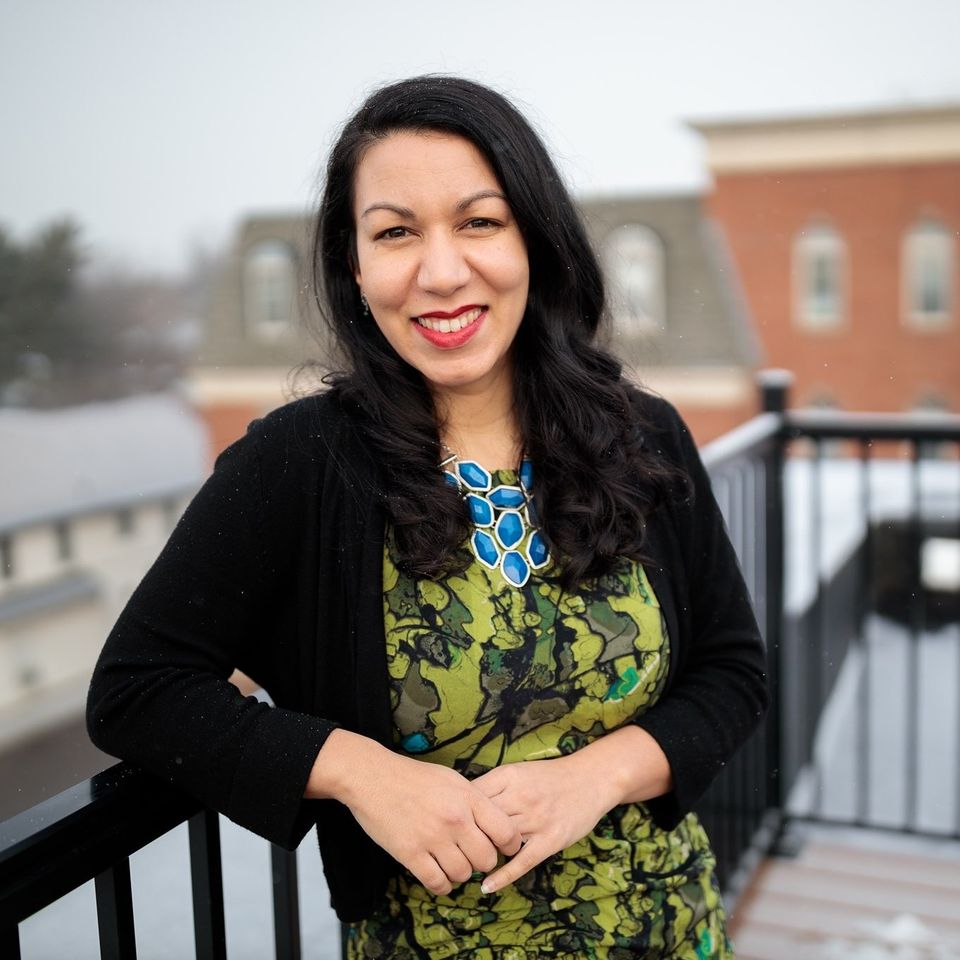
[dropcap]I[/dropcap]n 2006, Kesha Ram got her start in politics when she introduced Bernie Sanders and Barack Obama at an event. Obama, then a senator, encouraged her to run and as she says, two years later they shared a ballot: he became the 44th President of the United States and she became the youngest legislator in the country!
Yet she emphasizes that one has to do the hard work to get there and there is no overnight success. Although only 5% of elected officials in the country are under the age of 35, but in Congress, over half of them started in politics under the age of 35. She says, “So you do have to look at getting in the game young, chipping away, building a base, building a network, and you have to do that across the board. Indians should get used to taking risks and losing. When I ran for statewide office and lost in 2016, someone pulled me aside and said when Bernie Sanders was your age, he got 2% – you got 17%. We have to remember its okay to risk and it’s okay to lose because in the end it all matters and gives a lot more young women and young people of color people to look up to.”
A powerful lesson to be learned from the success of these candidates is the truth that every public office is important – be it a school board, a city council or a state legislature. They are the building blocks of a working democracy and build strength with voters who are being served.
Padma Kuppa points out this anomaly: “What’s surprising to me is the fact that we don’t care about down ballot. Somebody sailed in and is running for Congress, has never run for anything, hasn’t done anything in the district before, and we’re all interested in that particular candidate! I found in my first campaign that I was overlooked a lot of the time because I was running for a state seat and not a congressional seat, and I think that’s a challenge because what state legislators do is what affects people’s daily lives.”
For Indian-Americans who are structuring a future, down ballot elections may indeed be the road to success in America’s political life.
(This was first published in India in America, my weekly column in CNBCTV18.com)
